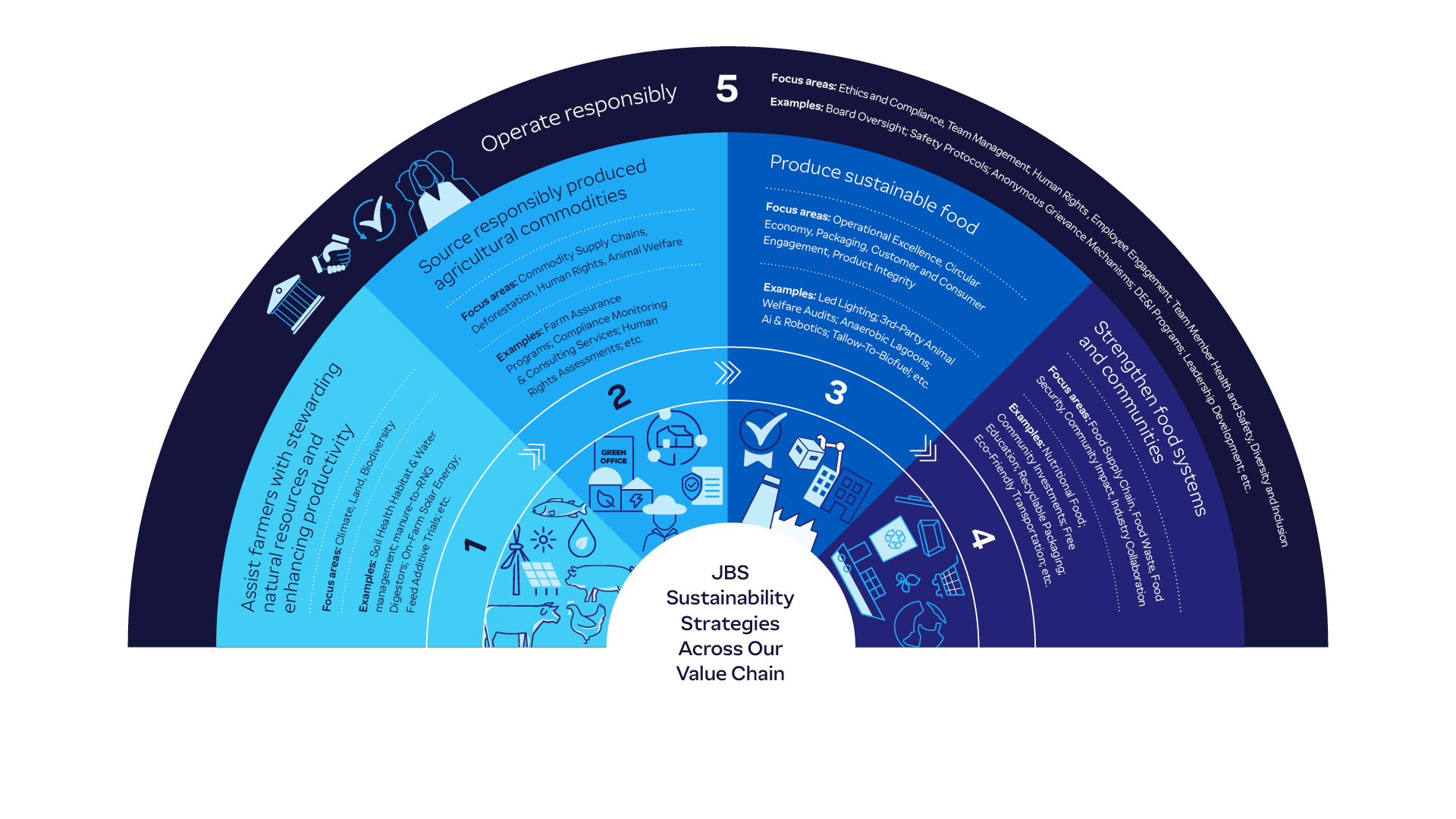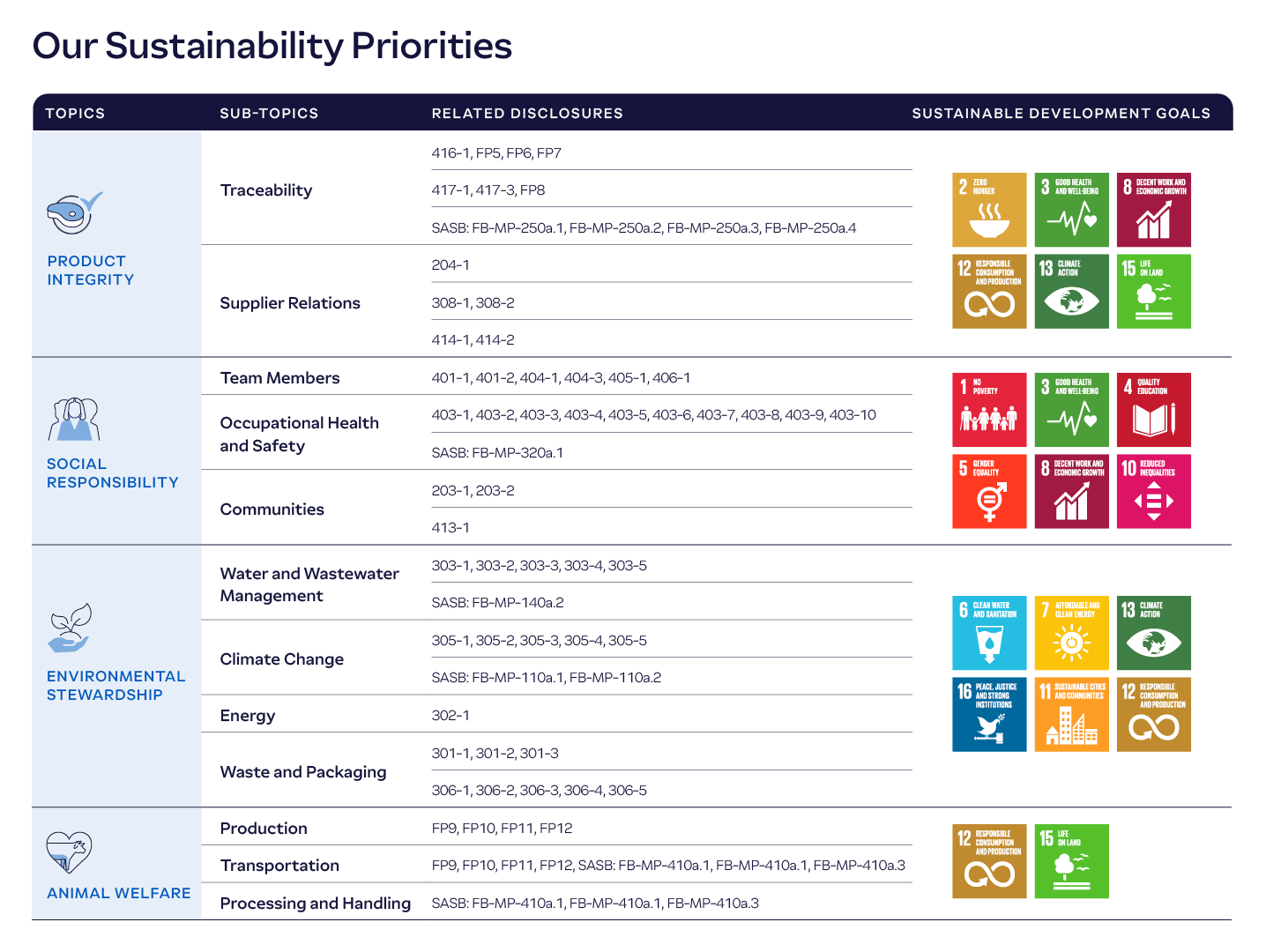Our Sustainability Strategy
(GRI 2-22)
At JBS, we are striving to set the food industry standard for profitable and sustainable food production for a growing planet. This means improving the sustainable performance and resiliency of not only our own operations but contributing to the enhanced sustainability of the greater food production system as a whole, while also helping our customers achieve their sustainability goals. To realize this vision, we have developed a Global Sustainability Strategy that mirrors our supply chain connections and addresses our material sustainability topics. This strategy will guide the company’s actions across environmental, social, and governance topics and serve as the overarching framework through which all our sustainability programs and initiatives are developed.

This structure was created to develop a global framework for sustainable excellence from which the whole company will benefit. At the executive level, the structure also supports the Socio-Environmental Responsibility Committee, which advises the Board of Directors on sustainability risks and opportunities.
In alignment with our global sustainability strategy and the United Nations Sustainable Development Goals (UN SDGs), JBS conducted a robust materiality analysis of key internal and external stakeholder perceptions and the different circumstances of our operations around the world. The most critical topics have been categorized into four overarching themes:
- Product Integrity
- Social Responsibility
- Environmental Stewardship
- Animal Welfare

A follow-up survey was conducted in 2022 and found that stakeholders’ leading topics of interest were emissions, deforestation, and employee health and safety, in line with our 2019 assessment. Building on this work, we conducted an extensive gap analysis of JBS performance and disclosures against third-party sustainability frameworks and standards, such as the Global Reporting Initiative (GRI), Corporate Sustainability Reporting Directive (CSRD), Carbon Disclosure Project (CDP), and more.
Insights from these processes served as important benchmarks for connecting our materiality matrix to the world’s most pressing issues and improving our sustainability team’s approach in 2023.
Additionally, results were reviewed with global JBS leaders across Human Resources, Ethics and Compliance, Food Safety and Quality Assurance, Animal Welfare, and other departments to increase awareness and co-develop strategies for improvement.
Understanding our priorities, challenges, and opportunities allows us to implement an informed approach to managing and continuously advancing our sustainability strategy. In addition to assessing past performance, we examine upcoming frameworks and regulations relevant to our industry to prepare against potential future gaps. In 2024, we will begin a double materiality assessment of our global company operations.
To accommodate the growing list of performance indicators we monitor, we have begun transitioning our internal collection and reporting processes onto a globally aligned platform named Envizi®. Once fully implemented in 2024, the system will capture and manage our quantitative and qualitative sustainability data in a single system of record across our global operations.
Stakeholder Engagement
(GRI 2-29)Engagement and collaboration with our stakeholders will always play a key role in both our organizational and sustainability strategies. Our sustainability team maintains continuous dialogue with JBS stakeholders to better understand how we can contribute, actively listen to and anticipate needs, and generate positive influence beyond our company. As our business units determine their own goals, policies, and procedures consistent with our global sustainability strategy and in compliance with the appropriate standards for their respective countries and industries, they also engage with stakeholders locally based on legitimate relationships.
We offer several different communication channels through which stakeholder feedback can be provided, including our:
- Company and brand websites
- Customer service channels
- Quarterly ESG webinars co-hosted by JBS Investor Relations and Sustainability teams *new in 2023
- Ethics Line
- Social media platforms such as LinkedIn, Instagram, and Facebook
- Internal and external communications teams
We believe that the industry-wide issues facing global agriculture require full value chain collaboration to identify scalable, sustainable approaches that prioritize continuous improvement and reduce impact. As such, we are active members of and participate in many trade and sustainability associations, as well as industry-based external working groups, associations, and initiatives related to the topic. Key examples include the Global Roundtable for Sustainable Beef (GRSB), World Economic Forum (WEF), Global Food Safety Initiative (GFSI), Sustainable Agriculture Initiative Platform (SAI), and more. A full list of these organizations is available on our website.here.

